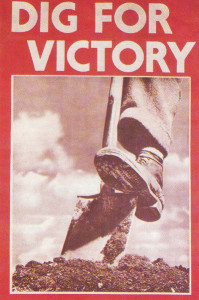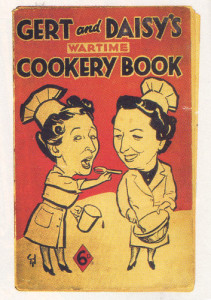 When the local council in Surbiton during the last war advertised allotments for cultivation in the recreation ground, my friend and I decided to have a go – and dig for victory.
When the local council in Surbiton during the last war advertised allotments for cultivation in the recreation ground, my friend and I decided to have a go – and dig for victory.
My only gardening experience had been on a little plot in my father’s garden, where I was encouraged to grow a few flowers and some lettuces and radishes, but I had always found great satisfaction in watching things grow.
We were quite daunted by the size of the plot, but it was a challenge and we set about digging and raking, ready for the first sowing. We were both working in reserved occupations and were on fire-watching and night duty rotas, so we spent as much time as we could during daylight hours on the allotment.
It was hard work, but we felt we were doing our bit to help the war effort by
growing our own vegetables. Our office colleagues were only too eager to buy any surplus, helping towards the cost of seeds.
Milk, in those days, was delivered by horse and cart and we have often laughed at the way we used to follow the milkman’s horse on our bicycles with a bucket and shovel!
One of my friends living a few miles away, who kept chickens, supplied us with bags of manure which we had to bring back on the trolleybus. It was amusing to see passengers’ faces when they caught the smell, but it helped us to grow some first-class vegetables.
When the ‘doodle-bugs’ were at their height and we could hear the drone getting nearer and nearer, many times we threw ourselves on the ground as it went over and then stopped; we knew then that it would probably have caused havoc somewhere near.
In spite of food rationing, we had the essentials and I think we were probably healthier than we are now. Some of us had a barter system going; for instance, as I did not take sugar in tea, I exchanged my ration for eggs and my friend swapped some of her tea ration for butter.
 The meat ration was small, but we occasionally managed to buy marrow bones from a friendly butcher, so there was always nourishing soup on the stove with all our vegetables.
The meat ration was small, but we occasionally managed to buy marrow bones from a friendly butcher, so there was always nourishing soup on the stove with all our vegetables.
We listened to the wireless when Mabel Constanduros gave her recipes on a programme called The Kitchen Front. She played the parts of Mrs. Buggins and Grandma – and their amusing chats and mispronunciation of words highlighted the recipes. I can still hear Grandma Buggins talking about “ingrediments”!
Another regular contributor was Dr. Charles Hill, the Radio Doctor, who broadcast when we were usually having breakfast and sometimes discussed subjects that were inclined to put one off the meal!
From 1942, America began sending us packets of dried eggs, so we were able to augment our egg ration. I can remember that my Australian sister-in-law sent us a fruit cake and some butter in which she had placed a whole fresh egg. She had packed it all so well that it arrived in perfect condition. This was, of course, just after the war ended, though rationing was still in force.
Those years of digging for victory left me with a love of growing my own vegetables and, although most of my fairly large garden is rapidly becoming wild, I still keep one patch cultivated. It is satisfying to be able to pull a few carrots or pick fresh peas and beans for a tasty meal, and have enough to give to all those kind friends who help me in so many ways. I may now live alone, but I am never lonely and I think the war years taught us a great deal about survival and independence.
Betty Pitcher








